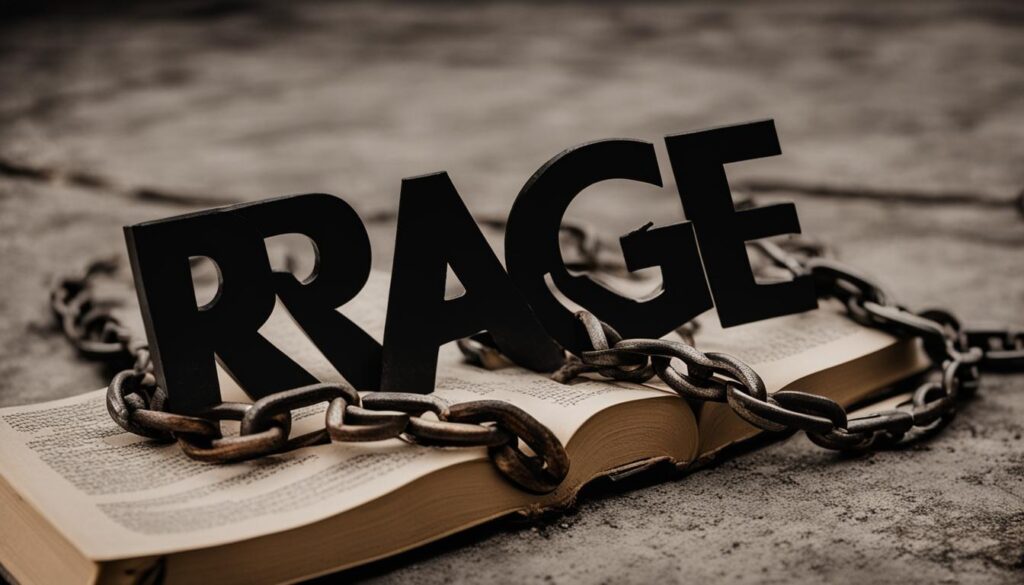Stephen King is a prolific writer known for his ability to grip readers with his works. In this deep dive article, we will examine one of his lesser-known but thought-provoking novels, Stephen King’s Rage, which explores teenage angst, alienation, and violence amongst other themes. We will provide an overview of its plot, characters, and themes, as well as explore its origin, the controversy surrounding it, its impact on readers and society, and its enduring legacy and influence. Join us on this journey as we explore the different facets of this intriguing novel.
The Origins of Stephen King’s Rage
Stephen King’s Rage, first published under the pseudonym Richard Bachman, is a novel that explores the psyche of a troubled teenager who holds his classmates hostage in a classroom. To understand the significance of this controversial novel, we need to delve into its origins.
King began writing Rage in the late 1960s while still in high school. He drew upon his personal experiences and observations to create a compelling story that captured the teenage angst and turmoil of the era.
The author has cited the 1966 shooting rampage at the University of Texas as one of the inspirations behind the novel. In an interview with Rolling Stone, King stated, “That shooting stuck with me […] It was like opening a door into a different kind of life for me. And I think that’s true for all of us. Once you see something like that, you can’t un-see it.”
The Writing Process
King wrote Rage over the course of a single week while attending the University of Maine in 1965. In a 2013 foreword to the novel, King reflected on this experience, stating, “I wrote Rage quickly, in longhand, and I still like the book.”
Despite its controversial subject matter, King felt that it was an important story that needed to be told. The novel was first published by Signet Books under the Bachman pseudonym in 1977, and then re-released as part of The Bachman Books collection in 1985. However, following a string of school shootings in the 1990s, King asked his publisher to let the novel go out of print, stating that he did not want it to be associated with real-life acts of violence.
Visual Representation of the Writing Process
The image above depicts Stephen King at his writing desk, pecking away at his typewriter as he crafts the intense and controversial novel that is Stephen King’s Rage.
Plot and Characters of Stephen King’s Rage
Stephen King’s Rage follows the story of a high school student, Charlie Decker, who has reached his boiling point. Fueled by anger and frustration at the injustices he perceives in his life, Charlie takes his classroom hostage.
The novel focuses on several characters, including the protagonist, Charlie, and his hostages. Throughout the story, King explores the motivations of each character and their reactions to the violent situation. The characters in Rage are complex and nuanced, with realistic behaviors and emotions.
The plot of Rage is fast-paced and intense, with tension building throughout the novel. King’s signature descriptive prose immerses readers in the terrifying situation, leaving them on edge until the very end.
One notable aspect of the plot is the unique perspective King brings to the story. Unlike many works of fiction centered around a school shooting, King chooses to focus on the perspective of the shooter rather than the victims. This approach allows for a deeper exploration of the character’s psyche and motivations.
Overall, Stephen King’s Rage is a gripping novel that delves into the complexity of human emotions, exploring the consequences of unchecked anger and frustration.
Themes Explored in Stephen King’s Rage

Stephen King’s Rage tackles several themes that are relevant to young adult readers. The novel explores teenage angst, highlighting the internal conflict and emotional turmoil experienced by high school students. This theme is exemplified in the protagonist, Charlie Decker, who feels alienated and misunderstood by his peers and teachers.
In addition to teenage angst, the novel also delves into the theme of alienation. Charlie’s feelings of isolation are further exacerbated by his inability to connect with his surroundings, which leads to his descent into violence. King deftly addresses the complexities of youth violence, offering a nuanced portrayal that highlights the underlying psychological factors.
Violence is another significant theme explored in the novel. Through the character of Charlie, King expertly examines the causes and consequences of violent behavior. The author’s treatment of this theme is both thought-provoking and incisive, challenging readers to consider the implications of such behavior.
In essence, Stephen King’s Rage is a gripping and immersive novel that delves into several themes that are prevalent in young adult literature. Its exploration of teenage angst, alienation, and violence remains timeless, resonating with readers even today.
The Controversy Surrounding Stephen King’s Rage
Stephen King’s Rage has sparked significant controversy since its initial publication in 1977. The novel is centered around a high school student who holds his classmates hostage, exploring themes of alienation and violence. While the book has been a popular read among young adults, critics have raised concerns over its portrayal of school shootings and the potential impact on vulnerable readers.
Furthermore, the novel has been associated with real-world incidents of school shootings, leading to its discontinuation. King’s publisher, Penguin Random House, discontinued the publication of Rage in 1999, after it was found that some school shooters had copies of the book in their possession.
Despite the novel’s controversial nature, some argue that it raises important questions about mental health and the pressures faced by teenagers. Others believe that it glorifies violence and should be banned outright.
| Pros | Cons |
|---|---|
| Raises awareness about youth mental health issues | Glorifies violence and could potentially influence vulnerable readers |
| Offers an honest portrayal of teenage struggles and the impact of societal pressures | Has been associated with real-world incidents of school shootings |
| Explores controversial themes that are often ignored in mainstream media | Could be triggering for individuals with a history of trauma or mental health issues |
King himself has spoken out about the controversy surrounding Rage, stating that he regrets publishing the book and that he no longer stands behind its message.
Impact on Readers and Society
Stephen King’s work has always left a lasting impact on readers, and his controversial novel, Stephen King’s Rage, is no exception. The portrayal of school violence and mental health struggles resonated with many readers, prompting discussions around these important societal issues.
The impact of Stephen King’s Rage is not limited to individual readers. The novel has also had a significant influence on discussions within broader society. In the aftermath of tragic school shootings, the novel’s content was scrutinized, with some suggesting that it may have contributed to the violence. As a result, the novel was ultimately discontinued by the author.
Despite this controversy, Stephen King’s Rage remains a thought-provoking work that continues to spark conversations about these crucial societal issues. The impact of the novel on readers and society is a testament to the power of literature to initiate change and provoke meaningful discussion.
The Discontinuation of Stephen King’s Rage
Despite the impact of Stephen King’s Rage and its relevance to current social issues, the novel has faced rare discontinuation. It is no longer in print due to the controversy surrounding its content and real-life incidents associated with the book.
| Reasons for Discontinuation | Subsequent Decision by Stephen King |
|---|---|
| Connection to school shootings and copycat incidents | King requested that the novel be taken out of circulation |
| Increased criticism and scrutiny following mass shootings | |
| Desire to distance himself from the negative impact of the novel |
Despite the novel’s discontinuation, Stephen King has continued to address its themes in other works and remains an influential author in the literary world.

Legacy and Influence of Stephen King’s Rage
Although it was published over four decades ago, Stephen King’s Rage continues to have a lasting legacy on readers and future generations of writers alike. The book’s impact has been felt far beyond its publication date.
One major reason for its lasting legacy is the contemporary relevance of its themes. The book deals with issues such as teenage angst, violence, and alienation that remain prevalent in society today. Additionally, King’s frank and unflinching portrayal of controversial subjects has influenced a generation of writers who have sought to emulate his style.
Many critics have praised the novel for its daring and innovative approach to storytelling. Its first-person narrative style immerses readers in the plot and characters, creating an engrossing and unforgettable reading experience that continues to captivate audiences.
Stephen King’s Rage has also left its mark on popular culture. Its influence can be seen in numerous works, including films, television shows, and other prominent literary works. Many authors have cited King as a significant influence on their writing, and his work has had an enduring impact on the horror genre as a whole.
In conclusion, Stephen King’s Rage remains a groundbreaking and influential work that continues to inspire readers and writers alike. Its themes and impact are as relevant today as they were when the book was first published, and its legacy will undoubtedly endure for generations to come.
Similar Works by Stephen King
If you enjoyed Stephen King’s Rage and are looking for similar works, you’re in luck! King has a vast array of novels and stories that explore similar themes and genres. Here are some recommendations for further reading:
Carrie
Carrie shares several similarities with Rage, including its focus on teenage angst and violence. The novel follows the story of Carrie White, a high school student with telekinetic powers, who is bullied and tormented by her classmates. As she becomes more isolated and wracked by trauma, she unleashes her powers in a final, terrifying act of revenge.
The Long Walk
The Long Walk is another early novel by Stephen King that explores the darker side of teenage rebellion. The novel takes place in a dystopian future where every year, one hundred teenage boys must participate in a grueling and deadly competition called “The Long Walk.” The winner is the last person standing, and all others are killed.
The Body
The Body is a novella that was adapted into the movie Stand by Me. The story follows four boys who embark on a journey to find the body of a missing child. Along the way, they deal with issues of childhood trauma, abuse, and loss of innocence.
The Stand
Finally, for readers who enjoyed the apocalyptic elements of Rage, The Stand is a must-read. The novel takes place in a world destroyed by a deadly virus and follows the struggles of a group of survivors as they try to rebuild society and battle a powerful evil force.
Critical Reception of Stephen King’s Rage
Stephen King’s Rage received a mixed critical reception upon its initial release in 1977. Some critics praised the novel for its exploration of teenage isolation and anger, while others raised concerns about its depiction of violence and its potential influence on young readers.
In more recent years, the critical reception of Rage has shifted. While some still view the novel as problematic, others have reevaluated its significance in the context of King’s greater body of work.
According to Goodreads, Rage has an average rating of 3.78 out of 5 stars and over 28,000 ratings. User reviews range from praising the novel’s exploration of adolescence to criticizing its portrayal of mental illness.
Notable Reviews
| Source | Review |
|---|---|
| The New York Times | “Rage is a brilliant achievement, a startlingly original and unsettling view of human nature and its relationship to society. It is also mercilessly horrifying.” |
| The Guardian | “Despite King’s success, no publisher wants to touch [Rage]. In today’s America, this is entirely understandable: it is a time bomb. A brilliantly told story about a teen-school-killing which, King says, haunts him to this day.” |
| The Los Angeles Times | “Rage could be seen as the product of youthful exuberance and misguided judgment, and as such is far from without interest. It is a nervy piece of work, imbued with a kind of breathless passion that few of King’s later, more seasoned books possess.” |
While reception to Stephen King’s Rage has been varied, the novel remains an important part of the author’s early career and broader impact on the horror genre.
The Enduring Popularity of Stephen King’s Rage
Despite being one of King’s lesser-known works, Stephen King’s Rage has retained a devoted following throughout the years, cementing its place in the canon of American literature. But what is it about this controversial, sometimes polarizing novel that has inspired such an enduring appeal?
Perhaps one of the key factors contributing to its popularity is its candid exploration of the teenage experience and the complex emotions that come with adolescence. Through its depiction of a high school student’s violent outburst and subsequent hostage situation, Rage delves into themes of alienation, isolation, and the destructive power of repressed anger.
Moreover, Rage’s frank portrayal of taboo subjects, such as mental health, drug use, and school violence, has drawn attention from readers looking for works that push the boundaries of traditional literature.
Stephen King’s reputation as America’s “Master of Horror” also likely plays a significant role in the novel’s continued success. King’s ability to craft suspenseful, terrifying plots and create unforgettable characters has attracted generations of devoted fans, who continue to turn to Rage as a prime example of his early style.
Ultimately, Rage’s enduring popularity can be attributed to its ability to speak to the timeless struggles of adolescence, while also pushing boundaries with its unflinching portrayal of controversial subjects. Its unique blend of social commentary, psychological insight, and relentless suspense make it a must-read for fans of Stephen King and lovers of bold, thought-provoking literature.
Conclusion
Stephen King’s Rage is a novel that remains relevant today, despite being published over four decades ago. Our deep dive has explored its origins, plot, characters, themes, controversies, critical reception, and enduring legacy.
King’s ability to address complex themes such as teenage angst, alienation, and violence in a thought-provoking and impactful manner is a testament to his literary prowess.
While its discontinuation is unfortunate, the impact of Rage on readers and society as a whole has been undeniable. From influencing discussions around youth violence and mental health to leaving its mark on the literary world, Rage has secured its place in King’s repertoire and popular culture.
Through our exploration of Rage, we hope to have provided readers with a comprehensive understanding of its significance. Whether you are a fan of Stephen King or simply curious about this lesser-known novel, we encourage you to delve deeper and discover its thought-provoking themes and enduring legacy.



